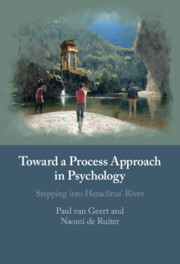Book contents
- Toward a Process Approach in Psychology
- Toward a Process Approach in Psychology
- Copyright page
- Contents
- Figures
- Acknowledgments
- Introduction
- Chapter 1 Change, the Final Frontier
- Chapter 2 A (Selected) Foundation for a Process Approach
- Chapter 3 The Goal of Socrates
- Chapter 4 Esteeming Entities
- Chapter 5 A Person Acting amongst Persons
- Chapter 6 Cliffhangers and Utilitarian Infants
- Chapter 7 Causes, Kings, and Interventions
- Chapter 8 (Compl)explanation and King Alfonso’s Lament
- Chapter 9 What’s in a Name?
- Chapter 10 (Un)Certainties
- Chapter 11 Troubled Waters of Heraclitus’ River?
- Chapter 12 Psychological Science as a Complex Dynamic System
- Glossary
- References
- Index
Chapter 5 - A Person Acting amongst Persons
Enacting a Process Ontology in Self-Esteem Research*
Published online by Cambridge University Press: 14 July 2022
- Toward a Process Approach in Psychology
- Toward a Process Approach in Psychology
- Copyright page
- Contents
- Figures
- Acknowledgments
- Introduction
- Chapter 1 Change, the Final Frontier
- Chapter 2 A (Selected) Foundation for a Process Approach
- Chapter 3 The Goal of Socrates
- Chapter 4 Esteeming Entities
- Chapter 5 A Person Acting amongst Persons
- Chapter 6 Cliffhangers and Utilitarian Infants
- Chapter 7 Causes, Kings, and Interventions
- Chapter 8 (Compl)explanation and King Alfonso’s Lament
- Chapter 9 What’s in a Name?
- Chapter 10 (Un)Certainties
- Chapter 11 Troubled Waters of Heraclitus’ River?
- Chapter 12 Psychological Science as a Complex Dynamic System
- Glossary
- References
- Index
Summary
The small and somewhat fringe praxis of processual self-esteem research is described with respect to its enactment of a process ontology. The chapter shows that a process approach has resulted in a focus on ‘how’ questions in self-esteem research (rather than on predictive validity, for example) and a more pluralistic approach to the operationalization of self-esteem. What the various processual-studies reviewed have in common is a conceptual and methodological approach to self-esteem as a situated and action-based process, rather than a thing that individuals have to different degrees. Here, the central role of situational affordances is highlighted. This processual praxis often relies explicitly on complex dynamic systems principles, such as self-organization, emergence, variability, and attractor landscapes. With processes and actions as its focus, this praxis constructs self-esteem knowledge that emphasizes one’s agency in the world and the centrality of our actual context-bound actions and experiences as we move through it. This chapter ends with a discussion of how a process approach is beneficial for the lived reality of self-esteem, where individuals are encouraged to embrace and reflect on their situated and fluctuating experiences of self, rather than a pursuit of ‘high’ self-esteem.
Keywords
- Type
- Chapter
- Information
- Toward a Process Approach in PsychologyStepping into Heraclitus' River, pp. 86 - 114Publisher: Cambridge University PressPrint publication year: 2022

